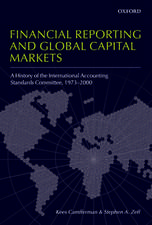British Banking: Continuity and Change from 1694 to the Present
Autor Ranald C. Michieen Limba Engleză Hardback – 9 noi 2016
Preț: 644.36 lei
Preț vechi: 923.42 lei
-30% Nou
Puncte Express: 967
Preț estimativ în valută:
123.31€ • 127.96$ • 103.07£
123.31€ • 127.96$ • 103.07£
Carte tipărită la comandă
Livrare economică 04-10 martie
Preluare comenzi: 021 569.72.76
Specificații
ISBN-13: 9780198727361
ISBN-10: 0198727364
Pagini: 348
Dimensiuni: 161 x 235 x 24 mm
Greutate: 0.64 kg
Editura: OUP OXFORD
Colecția OUP Oxford
Locul publicării:Oxford, United Kingdom
ISBN-10: 0198727364
Pagini: 348
Dimensiuni: 161 x 235 x 24 mm
Greutate: 0.64 kg
Editura: OUP OXFORD
Colecția OUP Oxford
Locul publicării:Oxford, United Kingdom
Recenzii
A fine work of synthesis and a focused reassessment of the nature of British banking in the long run. It is a must read for historians, economists and policy makers.
The stated goal of British Banking is to cover enough time and enough details to help policy makers understand where banking is going by explaining how it got to the present. In this, Professor Ranald Michie succeeds. He uses 270 pages and about 700 sources to span the last three centuries. The author's command of such a substantial portfolio attests to decades of experience as a financial historian.
The stated goal of British Banking is to cover enough time and enough details to help policy makers understand where banking is going by explaining how it got to the present. In this, Professor Ranald Michie succeeds. He uses 270 pages and about 700 sources to span the last three centuries. The author's command of such a substantial portfolio attests to decades of experience as a financial historian.
Notă biografică
Ranald Michie is one of the world's leading financial historians. He has published extensively on various aspects of the history of finance over the last 40 years. Among his many books are ones on the City of London, the London Stock Exchange and the Global Securities Market.


















